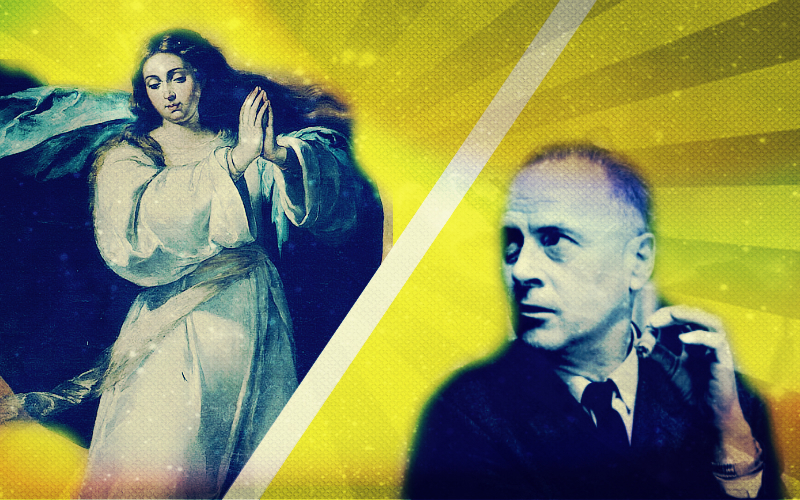When Mary Told McLuhan "the Medium is the Message"

If you haven’t heard of Marshall McLuhan, you’ve probably heard his great aphorism, “the medium is the message.”
Quite the celebrity in the 1960s for his incisive commentary on media, he was a frequent guest on radio and TV, his books sold millions of copies, and he even had a cameo in Woody Allen’s film Annie Hall in which he famously said, “You know nothing of my work!”
All the while, few people knew that he was a devout Christian – and that the Blessed Virgin Mary had personally given him confirmation of his radical ideas.
Another Chesterton Convert
Born in Alberta, Canada to Christian parents, Herbert Marshall McLuhan (he went by his middle name, ostensibly to distinguish himself from his father Herbert) found himself struggling with agnosticism in college. Though he first studied engineering, he turned to literature to “gratify his soul’s hunger for truth and beauty.”
After completing a B.A. and M.A. at the University of Manitoba, he traveled to England to pursue doctoral studies at the University of Cambridge. While studying the history of the classical trivium, he read the early Church fathers and medieval thinkers, which influenced his conversion to Catholicism. But he gave special credit to the writings of G.K. Chesterton: “[H]ad I not encountered Chesterton, I would have remained agnostic for many years at least.”
Though he didn’t talk about it publicly, he took his newfound Catholic faith very seriously. Douglas Coupland describes McLuhan’s faith as having been “hard core”:
Marshall, like most converts, quickly became hard core. He went to Mass almost daily every day for the rest of his life. He recited the rosary. He was a firm believer in Hell. He was disgusted that other Catholics weren’t Catholic enough. Above all, he believed that because God made the world, it must, in the end, be comprehensible, and that a sense of the divine could lead to an understanding of the mundane.
After completing his doctorate in the midst of the Second World War, he taught at various small colleges until he took a position at the University of Toronto, where he stayed for the rest of his career.
Media Mystic?
His fame grew in the 1950s and ’60s, but so did controversy around his ideas. Critics disliked his rhetorical style, pointed out apparent contradictions in his works, and accused him of overemphasizing the importance of technology.
But McLuhan remained unfazed because he had someone more important on his side: the Mother of God.
This story was passed on from one of his associates:
He alluded to it very briefly once, almost fearfully, in a please-don’t-laugh-at-me tone. He didn’t say, “I know this because the Blessed Virgin Mary told me” but it was clear from what he said that he was interrogating her about his ideas and one of the reasons he was so sure about certain things was that the Virgin had certified his understanding of them.
Was he visited by her? Did he have mystical experiences? Or did he simply feel that he received confirmation in prayer?
If McLuhan really did receive supernatural aid in his intellectual pursuits, he wouldn’t necessarily be the first: e.g., it is said that the Holy Spirit dictated to St. Gregory the Great the chants which now bear his name.
It’s not clear what the precise nature was of McLuhan’s claimed interactions with the Blessed Mother. But it’s nonetheless a fascinating insight into both the spiritual and academic life of one of the 20th century’s most influential thinkers.